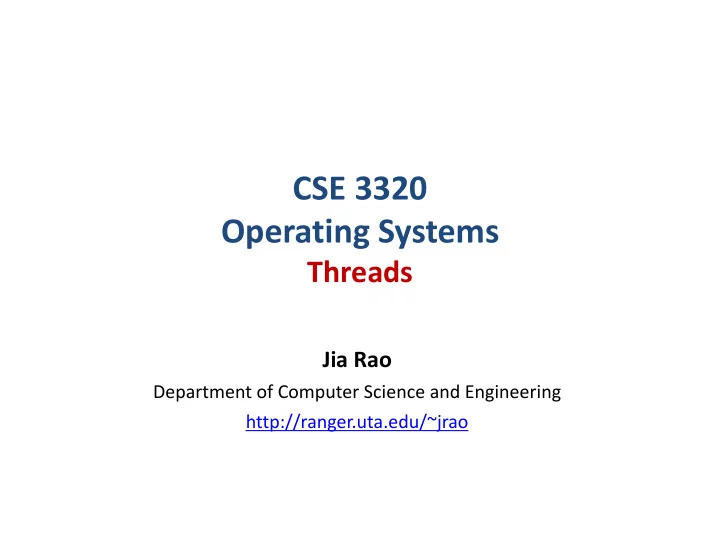

CSE 3320 Operating Systems Threads Jia Rao Department of Computer Science and Engineering http://ranger.uta.edu/~jrao
Recap of the Last Class • Processes A program in execution o 5 (3)-state process model o Process control block o Execution flow } Resources } • Linux processes The task_struct structure o Which field stores the program counter ? o The thread field } Saving hardware registers can not be expressed in C, but in assembly } It is a processor-specific context } ¨ SRC/arch/x86/include/asm/processor.h ¨ Field ip in struct thread_struct
Thread and Multithreading • Process o resource grouping and execution • Thread o a finer-grained entity for execution and parallelism o Lightweight process o A program in execution without dedicated address space • Multithreading o Running multiple threads within a single process
Processes v.s. Threads • Process o Concurrency } Sequential execution stream of instructions o Protection } A dedicated address space • Threads o Separate concurrency from protection o Maintain sequential execution stream of instructions o Share address space with other threads
A Closer Look • Processes • Threads o Have data/code/heap o No data segment or heap o Multiple can coexist in a o Include at lease one thread process o Have own address space, o Share code, data, heap, and isolated from other I/O processes o Have own stack and o Expensive to create registers o Inexpensive to create o Expensive context o Inexpensive context switching switching o IPC can be expensive o Efficient communication
An Illustration
Why Multiprogramming ? CPU utilization as a function of the number of processes in memory.
Why threads ? • Express concurrency o There are other ways to explore concurrency (e.g., non-blocking I/O), but they are difficult to program • Efficient communication o Communication can be carried out via shared data objects within the shared address space o Inter-process communication usually requires other OS services: file system, network system • Efficient creation o Only create the thread context
Thread Usage 1 Why not multiple processes ? A word processor with three threads.
Thread Usage 2 Why not multiple processes ? Any problem with multithreading ? A multithreaded Web server.
A Simple Implementation Void *worker(void *arg) // worker thread { unsigned int socket; socket = *(unsigned in *)arg; process (socket); pthread_exit(0); } int main (void) // main thread, or dispatcher thread { unsigned int server_s, client_s, i=0; pthread_t threads[200]; server_s = socket(AF_INET, SOCK_STREAM, 0); …… listen(server_s, PEND_CONNECTIONS); while(1){ client_s = accept(server_s, …); pthread_create(&threads[i++], &attr, worker, &client_s); } }
Implementing Threads in User-Space • User-level threads: the kernel knows nothing about them A user-level threads package
User-level Thread - Discussions • Advantages o No OS thread-support needed o Lightweight: thread switching vs. process switching o Local procedure vs. system call (trap to kernel) o When we say a thread come-to-life ? SP & PC switched o Each process has its own customized scheduling algorithms o thread_yield() • Disadvantages o How blocking system calls implemented? Called by a thread? o Goal: to allow each thread to use blocking calls, but to prevent one blocked thread from affecting the others o How to change blocking system calls to non-blocking? o Jacket/wrapper: code to help check in advance if a call will block o How to deal with page faults? o How to stop a thread from running forever? No clock interrupts
Implementing Threads in the Kernel • Kernel-level threads: when a thread blocks, kernel re- schedules another thread • Threads known to OS Scheduled by the scheduler • • Slow o Trap into the kernel mode • Expensive to create and switch o Less expensive if in the same process o Registers, PC, stack pointer need to be created/changed o Not the memory management info Any problem ? A threads package managed by the kernel Write a program that forks from a multithreaded process
Hybrid Implementations • Use kernel-level threads and then multiplex user-level threads onto some or all of the kernel-level threads Multiplexing user-level • threads Onto kernel-level threads • Enjoy the benefits of user and kernel level threads Too complex ! Any other problem ? Priority inversion Multiplexing user-level threads onto kernel-level threads
Threading Models • N:1 (User-level threading) o GNU Portable Threads • 1:1 (Kernel-level threading) o Native POSIX Thread Library (NPTL) • M:N (Hybrid threading) o Solaris
An Example void *my_thread(void *arg) { int *tid = (int *)arg; printf("Hello from child thread: %d\n", *tid); return NULL; } int main(int argc, char *argv[]){ pthread_t threads[NR_THREADS]; for (i = 1; i < NR_THREADS; i++){ tid[i] = i; pthread_create(&threads[i], &a, my_thread, &tid[i]); } printf("Hello from the mother thread 0 !\n"); for (i = 1; i < NR_THREADS; ++i) { pthread_join(threads[i], NULL); } return 0; }
Threads in Linux • Thread control block (TCB) o The thread_stuct structure o Includes registers and processor-specific context • Linux treats threads like processes o Use clone() to create threads instead of using fork() o clone() is usually not called directly but from some threading libraries, such as pthread.
Summary • Processes v.s. threads? • Why threads ? o Concurrency + lightweight • Threading models o N:1, 1:1, M:N • Additional practice o Find out what threading model does Java belong to o Write (download) a simple multithreaded java program o When it is running, issue ps –eLf | grep YOUR_PROG_NAME Download glibc at http://ftp.gnu.org/gnu/glibc/ and see the o nptl implementation
Recommend
More recommend